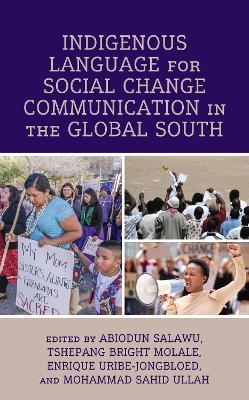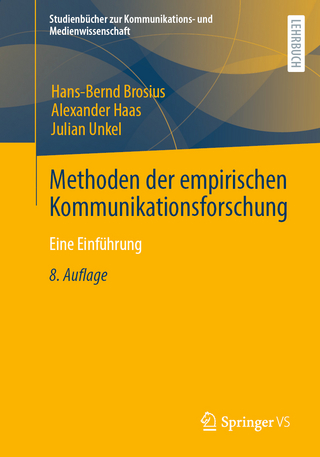
Indigenous Language for Social Change Communication in the Global South
Lexington Books/Fortress Academic (Verlag)
978-1-6669-1204-3 (ISBN)
Indigenous Language for Social Change Communication in the Global South brings together voices from the margins to engage in dialogue about common social change issues in Latin America, Africa, and Asia. This book argues that resistance and social movements, expressed in music and songs and exchanged via radio, remain fundamental to ensure that the linguistic and cultural diversity of the world progresses despite colonizing pressures. Contributors present cases that explore how indigenous communities use mediums such as the radio to help support their language, identity, and expand their own social change. Highlighting the centrality of music in the development of political discussions and language as a central part of collective identity, contributors analyze how these mediums function as both a vessel and a link for information and cultural cohesion of those engaging in social change. Scholars of communication, sociology, and development studies will find this book of particular interest.
Abiodun Salawu is professor of journalism, communication, and media studies and director of Indigenous Language Media in Africa (ILMA) at North-West University. Tshepang Bright Molale is senior lecturer in the School of Social Sciences at the University of Mpumalanga. Enrique Uribe-Jongbloed is professor and researcher at the School of Social Communication and Journalism, Universidad Externado de Colombia. Mohammad Sahid Ullah is professor of communication and journalism at the University of Chittagong.
Contents
Introduction: Social Change Communication in Indigenous Languages
Abiodun Salawu, Tshepang Bright Molale, and Enrique Uribe-Jongbloed
Part 1. Indigenous Mass Media and Health Communication
Chapter 1. Xhosa/English (Xhoslish) Code-Switching in Radio Health Programming towards Communication for Development and Social Change: Analysis of Selected Radio Station in South Africa
Moses Ofome Asak, Tshepang Bright Molale, and Abiodun Salawu
Chapter 2. Critical Discourse Analysis of Traditional Medicine Outdoor Advertising and Public Health Issues in Northern Nigeria
Aondover Eric Msughter, Mohammad Garba Kuchi, and Abubakar Aliyu Abba
Chapter 3. Indigenous Language Status and the Threat to Transmission and Acquisition of Traditional Medical Knowledge (TMK)
Janet O. Adekannbi
Chapter 4. Indigenous Languages, Digital Media, and COVID-19 Pandemic in the Global South: A South African Discourse
Fulufhelo Oscar Makananise, Edgar Julius Malatji, and Shumani Eric Madima
Part 2. Resistance, Resilience, Sustainability, and Identity in Indigenous Language Media
Chapter 5. Language, Media, and Resistance: Indigenous Communicators in the Extreme North of the Brazilian Amazon
Lisiane Aguiar and Jan Pöhlmann
Chapter 6. African Magic Igbo’s Contribution to Development and Social Change Communication as an Indigenous Language Media: Viewers’ Perceptions on Twitter
Deborah Dike
Chapter 7. Indigenous Language Media, Resistance, and Resilience
Esteban Emilio Mozonyi and María Suárez Luque
Chapter 8. Towards a New Research Agenda on Indigenous Language Community Media in Agricultural and Sustainable Resource Management in the Global South
Nolukhanyo Metula
Chapter 9. The Role of Native Languages on the National Media for Justice and Social Change: The Kawsachun Coca Radio and Somos Pueblo TV Program Experiences
Eduardo López Rosse
Part 3. Indigenous Language Radio and Music for Conflict Resolution and Social Change
Chapter 10. Constructing Community and Building Identity through Indigenous Community Media: The Case of Radio Swayamshakti in Odisha, India
Aniruddha Jena, Vinod Pavarala, and Vasuki Belavadi
Chapter 11. Communicating and Attaining Social Change through Indigenous Nigerian Pidgin English: An Assessment of Brekete Family Programme on Human Rights Radio 101.1, Abuja, Nigeria
Silas Udenze and Antoni Roig Telo
Chapter 12. Rethinking Conflict Resolution, Peace, and Unity through Indigenous Language Media in Contemporary Zimbabwe: A Multilingual Perspective
Tobias Marevesa, Paul Nepapleh Nkamta, and Esther Mavengano
Chapter 13. Can Vernacular Radio Be Conflict Sensitive? An Analysis of Vernacular Radio Programming in Western Kenya
John Ndavula and Jackline U. Lidubwi
Chapter 14. A Systemic Review of Indigenous Protest Songs as a Conduit for Social Mobilisation in South Africa
Rhoda T. I. Patrick, Oluremi A. Abiolu, and Hosea O. Patrick
Chapter 15. Yoruba Music: A Socio-cultural Tool for Traditional and Modern Political Participation
Omowale Adelabu and IfeKristi Ayo-Obiremi
About the Contributors
| Erscheinungsdatum | 25.05.2023 |
|---|---|
| Reihe/Serie | Communication, Globalization, and Cultural Identity |
| Co-Autor | Abubakar Aliyu Abba |
| Sprache | englisch |
| Maße | 158 x 237 mm |
| Gewicht | 540 g |
| Themenwelt | Sozialwissenschaften ► Kommunikation / Medien ► Kommunikationswissenschaft |
| ISBN-10 | 1-6669-1204-2 / 1666912042 |
| ISBN-13 | 978-1-6669-1204-3 / 9781666912043 |
| Zustand | Neuware |
| Informationen gemäß Produktsicherheitsverordnung (GPSR) | |
| Haben Sie eine Frage zum Produkt? |
aus dem Bereich


